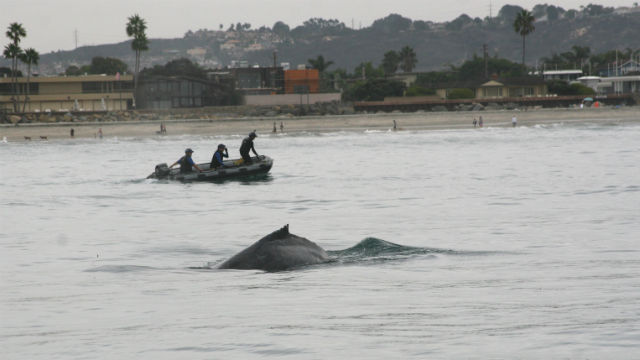 A SeaWorld rescue team attempts to disentangle a humpback whale caught in a lobster trap off La Jolla. (FILE photo courtesy of the US Coast Guard)
A SeaWorld rescue team attempts to disentangle a humpback whale caught in a lobster trap off La Jolla. (FILE photo courtesy of the US Coast Guard)
Waters off California, Massachusetts, Alaska, and Hawaii saw a sharp rise in whale entanglements last year, part of a nationwide increase documented in a new report from the National Oceanic and Atmospheric Administration.
The agency confirmed 95 large whales became entangled in 2024, up from 64 the previous year and above the historical average of about 71 annually. Most of the cases involved threatened or endangered humpback whales, and critically endangered North Atlantic right whales were also affected.
The report comes as NOAA faces budget cuts and as Congress debates weakening the Marine Mammal Protection Act, according to a news release.
Fishing gear that uses traps to catch lobster, crab, and other species remains a leading cause of whale deaths. Ropes connecting traps on the seafloor to buoys at the surface often wrap around whales’ mouths, fins, tails, and bodies. These entanglements slow them down, make it difficult to swim, feed, or reproduce, and frequently lead to death from infection, malnutrition, or drowning.
Senior Campaign Director Gib Brogan said the numbers show the need for stronger protections.
“The largest animals on the planet don’t stand a chance when there are too many fishing lines in times and places that are important to whales. These numbers represent more than dead whales, they showcase needless suffering. This report paints a clear picture: our current safeguards are not enough. With current threats to the MMPA and funding cuts to NOAA, the numbers could climb even higher next year. To give whales a fighting chance, Congress must defend NOAA and core laws like the MMPA and accelerate the transition to whale-safe fishing solutions like ropeless or pop-up fishing gear to prevent off-the-charts entanglements.”
California Campaign Director and Senior Scientist Geoff Shester pointed to ongoing problems in the state’s Dungeness crab fishery.
“Fishery managers need to do more to provide whales with safe passage in U.S. waters. Despite efforts to shorten the California Dungeness crab season, too many humpback whales are being entangled because the season for using conventional traps is going on too long. Innovative pop-up fishing gear can restore fishing opportunities while allowing whales to safely migrate and feed.
“Experimental trials in the California Dungeness crab fishery — the largest and most successful of their kind — show that this gear design is profitable, reliable, and safe for whales. As fishers, gear manufacturers, and state wildlife officials embrace this innovation, we need the federal government to support fishers using pop-up gear and fully fund whale disentanglement teams and the National Marine Fisheries Service so that they can continue the important work of protecting threatened and endangered whales.”
Oceana outlined steps it says are critical to addressing the problem: reduce the number of vertical lines in the water, support alternative fishing gear such as ropeless or “pop-up” systems, maintain full funding for NOAA, and continue strong federal oversight under the MMPA.
READ NEXT